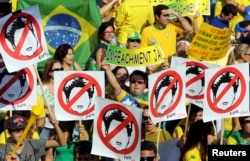Brazil's Supreme Court has suspended impeachment proceedings against President Dilma Rousseff until it rules on a secret vote that stacked a congressional committee with opponents trying to oust her.
The decision late Tuesday by a judge appointed by the president has stopped the creation of the committee until Brazil’s top court can meet Dec. 16 to decide whether the unprecedented secret ballot was valid.
The ruling was a reprieve for Rousseff because a court decision could favor her situation by curbing the power of her nemesis, lower house speaker Eduardo Cunha.
Cunha, who himself faces a possible congressional investigation on corruption charges, began the impeachment proceedings last week based on an opposition accusation that Rousseff broke Brazil's budget laws.
But the delay could also give Rousseff's opponents more time to mobilize public sentiment against an unpopular president who is besieged by a severe recession and a graft scandal that has ensnared dozens of her allies less than a year into her second term.
Justice Luiz Edson Fachin, whom Rousseff appointed to the court in June, said in his decision that the suspension of the impeachment proceedings was needed "to avoid acts that could eventually be invalidated by the Supreme Court."
Vote offers hope for Rousseff
The house voted in a tumultuous session earlier Tuesday to appoint the impeachment committee.
The session almost collapsed into chaos during an angry debate over the secret ballot, called by Cunha and which allowed wavering members of Rousseff's governing coalition to vote for a pro-impeachment committee without public record.
The Communist Party of Brazil, a small but staunch Rousseff ally, filed an injunction against the secret vote on Tuesday, adding to an earlier complaint on the constitutional validity of the opposition impeachment request.
In the secret ballot, lawmakers voted 272-199 for a committee controlled by Rousseff's opponents and pro-impeachment members of the centrist Brazilian Democratic Movement Party (PMDB), the biggest party in her coalition.
The tally suggested Rousseff still had the 171 votes, or one-third of the total seats, needed to block impeachment in the lower house.
If the committee is deemed valid and finds against Rousseff, the process will go to a full vote on the house floor, where the opposition needs two-thirds of the votes to begin a 180-day impeachment trial in the Senate. During that trial, Rousseff would be suspended and replaced by Vice President Michel Temer.
Replacement is setback for Rousseff
Tuesday's vote was a slap in the face for the PMDB leader in the lower house, Leonardo Picciani, an opponent of impeachment since Rousseff granted his faction two cabinet posts in August.
In a setback for Rousseff, the party replaced him on Wednesday with Leonardo Quintao, a congressman less sympathetic to her.
Rousseff is expected to win one round in her battle for political survival later Wednesday when the lower house ethics committee votes on whether to investigate speaker Cunha, who could lose his seat for lying about Swiss bank accounts.
Opponents who initiated the impeachment bid against Rousseff accuse her of breaking budget rules to boost spending during her re-election campaign last year. She has denied any wrongdoing.
A third of the lawmakers on the committee that is meant to decide whether Rousseff should be impeached are under investigation by the Supreme Court for corruption, money laundering, electoral fraud and other crimes, according to Congresso em Foco, a prominent Brasilia watchdog group.







